The Automotive Fuel Injector Market is estimated to be valued at USD 14.1 billion in 2025 and is projected to reach USD 25.5 billion by 2035, registering a compound annual growth rate (CAGR) of 6.1% over the forecast period.
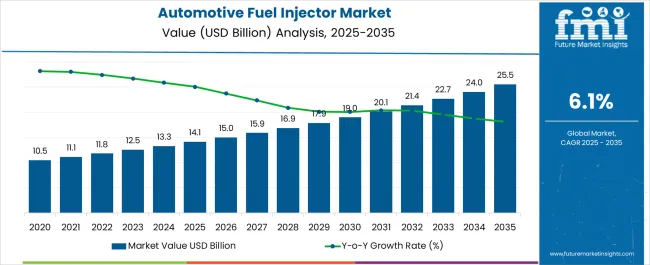
| Metric | Value |
|---|---|
| Automotive Fuel Injector Market Estimated Value in (2025 E) | USD 14.1 billion |
| Automotive Fuel Injector Market Forecast Value in (2035 F) | USD 25.5 billion |
| Forecast CAGR (2025 to 2035) | 6.1% |
The Automotive Fuel Injector market is gaining strong momentum, supported by the rising production of vehicles and the growing adoption of advanced fuel delivery systems to enhance engine performance. Increasing regulatory pressure on vehicle manufacturers to comply with emission standards is fueling demand for efficient injector systems that optimize fuel combustion and reduce pollutants. Technological advancements such as precise electronic fuel injection systems and lightweight injector designs are improving efficiency and durability, making them more attractive for mass deployment across passenger and commercial vehicles.
Growing consumer demand for fuel-efficient vehicles with lower operating costs is also shaping market dynamics. The integration of advanced sensors, AI-driven monitoring, and real-time data optimization in injector systems is helping automakers achieve better performance benchmarks.
In addition, the ongoing shift toward hybrid and smaller-displacement engines is increasing reliance on sophisticated fuel injector solutions As automotive manufacturers expand their global presence and invest in cleaner mobility solutions, the fuel injector market is expected to witness sustained growth, driven by regulatory frameworks, consumer expectations, and technological innovation.
The automotive fuel injector market is segmented by vehicle type, mechanical system, flow type, injection type, sales channel, and geographic regions. By vehicle type, automotive fuel injector market is divided into Passenger Cars, LCV (Light Commercial Vehicles), and HCV (Heavy Commercial Vehicles).
In terms of mechanical system, automotive fuel injector market is classified into Electronic Fuel Injector and Spring Loaded Injector. Based on flow type, automotive fuel injector market is segmented into Pulsed Injector and Continuous Injector. By injection type, automotive fuel injector market is segmented into Diesel Direct Injector, Gasoline Direct Injector, and Gasoline Indirect Injector.
By sales channel, automotive fuel injector market is segmented into OEM (Original Equipment Manufacturer) and Aftermarket. Regionally, the automotive fuel injector industry is classified into North America, Latin America, Western Europe, Eastern Europe, Balkan & Baltic Countries, Russia & Belarus, Central Asia, East Asia, South Asia & Pacific, and the Middle East & Africa.
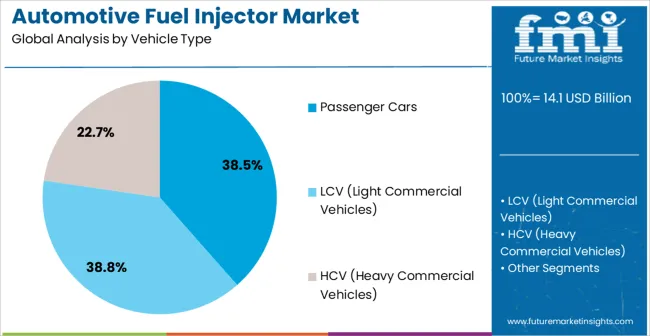
The passenger cars segment is projected to hold 38.5% of the Automotive Fuel Injector market revenue share in 2025, positioning it as the leading vehicle type. Growth in this segment is being driven by the large-scale production of passenger cars globally and increasing demand for fuel efficiency in compact and mid-sized vehicles. Rising consumer preference for economical cars with lower fuel consumption and reduced emissions has reinforced the adoption of advanced injector systems in this category.
Manufacturers are focusing on integrating electronic injectors into passenger cars to enhance combustion control, meet emission norms, and improve driving performance. Increasing urbanization and rising disposable incomes in developing regions are further accelerating passenger car sales, thereby driving injector demand.
The introduction of turbocharged engines and hybrid passenger cars is also amplifying reliance on high-performance fuel injectors As regulatory agencies tighten emission standards and consumers demand improved mileage, the passenger cars segment is expected to maintain its leadership role, supported by strong production volumes and continuous product innovation.
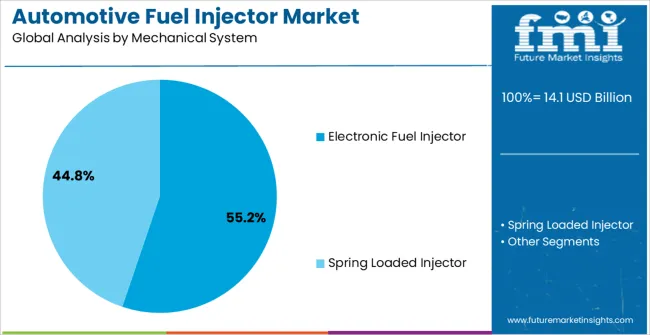
The electronic fuel injector segment is expected to account for 55.2% of the Automotive Fuel Injector market revenue share in 2025, making it the dominant mechanical system. This dominance is supported by the superior precision, efficiency, and adaptability of electronic systems compared to traditional carburetors or mechanical injectors. The capability to deliver accurate amounts of fuel into the combustion chamber ensures improved fuel efficiency and reduced exhaust emissions, aligning with increasingly stringent environmental regulations.
Electronic injectors also enhance engine performance by optimizing air-fuel ratios under varying driving conditions, which makes them the preferred choice for both passenger and commercial vehicles. Advancements in electronic control units and sensor technologies are further strengthening their performance reliability.
Additionally, the rising adoption of gasoline direct injection systems in modern vehicles is accelerating the demand for electronic injectors As automakers strive to balance performance, fuel economy, and compliance, electronic fuel injectors are anticipated to remain at the forefront of injector technologies, driving sustained market growth.
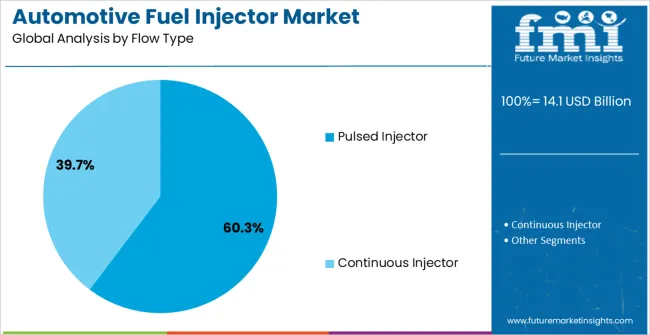
The pulsed injector segment is anticipated to capture 60.3% of the Automotive Fuel Injector market revenue share in 2025, establishing itself as the leading flow type. Growth in this segment is attributed to its ability to provide precise control over fuel delivery by pulsing injectors at timed intervals, which optimizes combustion efficiency and enhances overall vehicle performance. Pulsed injectors are particularly beneficial in applications requiring dynamic adjustments in fuel-air mixtures, such as in variable driving conditions or high-performance vehicles.
Their integration with advanced electronic control units enables real-time adaptability, ensuring compliance with strict emission norms while maintaining fuel economy. Automakers are increasingly deploying pulsed injectors to improve responsiveness, reduce fuel wastage, and extend engine longevity.
The growing adoption of downsized turbocharged engines is also supporting their usage, as pulsed injectors deliver the required precision for controlled combustion With rising emphasis on sustainable mobility and enhanced engine technologies, the pulsed injector flow type is expected to reinforce its leadership in the market through continuous innovation and global adoption.
An automotive engine depends on the ignition spark which is used to convert chemical energy present in the fuel into the kinetic energy. Automotive fuel injection system is used for mixing of the fuel with the air in an internal combustion chamber to produce the ignition spark. This system consists of an automotive fuel injector, which is used to inject the fuel either into the cylinder head or inlet manifold.
On the basis of fuel type, there are generally two types of fuel injectors: gasoline indirect fuel injector and diesel direct fuel injector. In the gasoline indirect fuel injector, gasoline is injected either into inlet port or inlet manifold where it is well mixed with the air before entering into the combustion chamber. In the diesel direct fuel injector, diesel is directly injected into the combustion chamber which is filled with the compressed air.
The process involves injection of fuel either in the inlet port or inlet manifold through the injector. Fuel mixes with the air passing through the inlet port or inlet manifold and this mixture enters the combustion chamber. The demand for automotive fuel injector in the global market is directed by the production of automobiles all across the globe.
Enhanced fuel efficiency, power output, exhaust emission & ability to accommodate alternative fuel is driving the demand of automotive fuel injector system in the global market. The main purpose of fuel injector system is to calibrate optimum fuel and air ratio that enters the combustion chamber.
The focus is to obtain maximum power & efficiency along with reduced gas consumption and harmful emission. All these factors are playing significant roles in driving the global automotive fuel injector market over the estimated period.
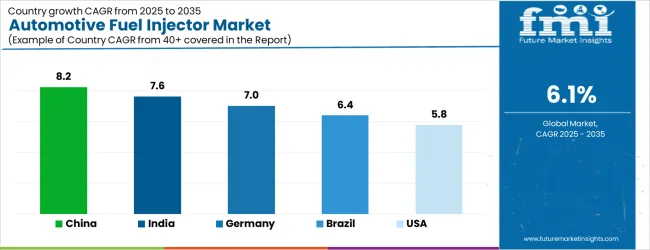
| Country | CAGR |
|---|---|
| China | 8.2% |
| India | 7.6% |
| Germany | 7.0% |
| Brazil | 6.4% |
| USA | 5.8% |
| UK | 5.2% |
| Japan | 4.6% |
The Automotive Fuel Injector Market is expected to register a CAGR of 6.1% during the forecast period, exhibiting varied country level momentum. China leads with the highest CAGR of 8.2%, followed by India at 7.6%. Developed markets such as Germany, France, and the UK continue to expand steadily, while the USA is likely to grow at consistent rates.
Japan posts the lowest CAGR at 4.6%, yet still underscores a broadly positive trajectory for the global Automotive Fuel Injector Market. In 2024, Germany held a dominant revenue in the Western Europe market and is expected to grow with a CAGR of 7.0%.
The USA Automotive Fuel Injector Market is estimated to be valued at USD 5.0 billion in 2025 and is anticipated to reach a valuation of USD 5.0 billion by 2035. Sales are projected to rise at a CAGR of 0.0% over the forecast period between 2025 and 2035. While Japan and South Korea markets are estimated to be valued at USD 734.4 million and USD 399.6 million respectively in 2025.
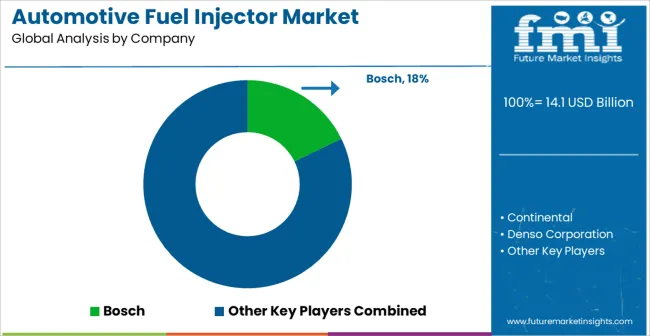
| Item | Value |
|---|---|
| Quantitative Units | USD 14.1 Billion |
| Vehicle Type | Passenger Cars, LCV (Light Commercial Vehicles), and HCV (Heavy Commercial Vehicles) |
| Mechanical System | Electronic Fuel Injector and Spring Loaded Injector |
| Flow Type | Pulsed Injector and Continuous Injector |
| Injection Type | Diesel Direct Injector, Gasoline Direct Injector, and Gasoline Indirect Injector |
| Sales Channel | OEM (Original Equipment Manufacturer) and Aftermarket |
| Regions Covered | North America, Europe, Asia-Pacific, Latin America, Middle East & Africa |
| Country Covered | United States, Canada, Germany, France, United Kingdom, China, Japan, India, Brazil, South Africa |
| Key Companies Profiled | Bosch, Continental, Denso Corporation, Hitachi Astemo, HKS, Infineon Technologies, Magneti Marelli, NGK, Phinia, and Stanadyne |
The global automotive fuel injector market is estimated to be valued at USD 14.1 billion in 2025.
The market size for the automotive fuel injector market is projected to reach USD 25.5 billion by 2035.
The automotive fuel injector market is expected to grow at a 6.1% CAGR between 2025 and 2035.
The key product types in automotive fuel injector market are passenger cars, lcv (light commercial vehicles) and hcv (heavy commercial vehicles).
In terms of mechanical system, electronic fuel injector segment to command 55.2% share in the automotive fuel injector market in 2025.






Our Research Products

The "Full Research Suite" delivers actionable market intel, deep dives on markets or technologies, so clients act faster, cut risk, and unlock growth.

The Leaderboard benchmarks and ranks top vendors, classifying them as Established Leaders, Leading Challengers, or Disruptors & Challengers.

Locates where complements amplify value and substitutes erode it, forecasting net impact by horizon

We deliver granular, decision-grade intel: market sizing, 5-year forecasts, pricing, adoption, usage, revenue, and operational KPIs—plus competitor tracking, regulation, and value chains—across 60 countries broadly.

Spot the shifts before they hit your P&L. We track inflection points, adoption curves, pricing moves, and ecosystem plays to show where demand is heading, why it is changing, and what to do next across high-growth markets and disruptive tech

Real-time reads of user behavior. We track shifting priorities, perceptions of today’s and next-gen services, and provider experience, then pace how fast tech moves from trial to adoption, blending buyer, consumer, and channel inputs with social signals (#WhySwitch, #UX).

Partner with our analyst team to build a custom report designed around your business priorities. From analysing market trends to assessing competitors or crafting bespoke datasets, we tailor insights to your needs.
Supplier Intelligence
Discovery & Profiling
Capacity & Footprint
Performance & Risk
Compliance & Governance
Commercial Readiness
Who Supplies Whom
Scorecards & Shortlists
Playbooks & Docs
Category Intelligence
Definition & Scope
Demand & Use Cases
Cost Drivers
Market Structure
Supply Chain Map
Trade & Policy
Operating Norms
Deliverables
Buyer Intelligence
Account Basics
Spend & Scope
Procurement Model
Vendor Requirements
Terms & Policies
Entry Strategy
Pain Points & Triggers
Outputs
Pricing Analysis
Benchmarks
Trends
Should-Cost
Indexation
Landed Cost
Commercial Terms
Deliverables
Brand Analysis
Positioning & Value Prop
Share & Presence
Customer Evidence
Go-to-Market
Digital & Reputation
Compliance & Trust
KPIs & Gaps
Outputs
Full Research Suite comprises of:
Market outlook & trends analysis
Interviews & case studies
Strategic recommendations
Vendor profiles & capabilities analysis
5-year forecasts
8 regions and 60+ country-level data splits
Market segment data splits
12 months of continuous data updates
DELIVERED AS:
PDF EXCEL ONLINE
Automotive Piezoelectric Fuel Injectors Market Size and Share Forecast Outlook 2025 to 2035
Automotive Fuel Accumulator Market Size and Share Forecast Outlook 2025 to 2035
Automotive Fuel Pulsation Damper Market Size and Share Forecast Outlook 2025 to 2035
Automotive Fuel Pressure Regulator Market Size and Share Forecast Outlook 2025 to 2035
Automotive Fuel Transfer Pumps Market Size and Share Forecast Outlook 2025 to 2035
Automotive Fuel Gauge Market: Trends, Technologies, and Growth Outlook
Automotive Fuel Delivery System Market Trends - Growth & Forecast 2025 to 2035
Automotive Fuel Return Line Market Insights - Trends, Demand & Growth 2025 to 2035
Automotive Fuel Gauge Sending Unit Market Report - Demand, Trends & Industry Forecast 2025 to 2035
Automotive Fuel Cock Market
Automotive Fuel Rail Market
Automotive E-Fuel Market Size and Share Forecast Outlook 2025 to 2035
Automotive Direct Liquid Cooling IGBT Module Market Size and Share Forecast Outlook 2025 to 2035
Automotive Hoses and Assemblies Market Size and Share Forecast Outlook 2025 to 2035
Automotive Network Testing Market Size and Share Forecast Outlook 2025 to 2035
Automotive Performance Part Market Size and Share Forecast Outlook 2025 to 2035
Automotive Carbon Ceramic Brake Market Size and Share Forecast Outlook 2025 to 2035
Automotive Camshaft Market Size and Share Forecast Outlook 2025 to 2035
Automotive Stamping Industry Analysis in India Size and Share Forecast Outlook 2025 to 2035
Automotive Cylinder Liner Market Size and Share Forecast Outlook 2025 to 2035

Thank you!
You will receive an email from our Business Development Manager. Please be sure to check your SPAM/JUNK folder too.
Chat With
MaRIA